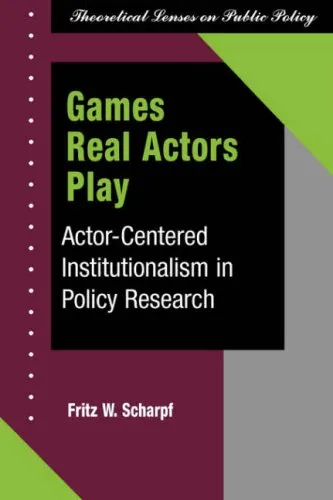Games Real Actors Play: Actor-centered Institutionalism In Policy Research (Theoretical Lenses on Public Policy)
4.5
Reviews from our users

You Can Ask your questions from this book's AI after Login
Each download or ask from book AI costs 2 points. To earn more free points, please visit the Points Guide Page and complete some valuable actions.Introduction to "Games Real Actors Play: Actor-centered Institutionalism in Policy Research"
"Games Real Actors Play: Actor-centered Institutionalism in Policy Research" stands as a cornerstone in the field of public policy and institutional analysis. Written by Fritz W. Scharpf, this influential work explores the intricate interplay of actors and institutions within the context of governance and policy-making. Moving beyond simplistic structures of institutionalism, this book introduces and develops the framework of actor-centered institutionalism (ACI), a theoretical perspective that combines rational choice theory, sociological insights, and institutional structures to analyze empirical case scenarios. Scharpf’s work is a vital resource for academics, policymakers, and practitioners seeking to uncover the mechanisms that govern social systems and collective decision-making processes.
Scharpf’s actor-centered institutionalism not only acknowledges the structured constraints imposed by institutions but also highlights the agency and strategic choices of individuals and groups operating within these frameworks. The nuanced approach bridges a gap between traditional institutional theories and behavioral dynamics, making it a practical tool for real-world policy analysis. This book has widely influenced the comparative institutional analysis across political science, policy research, and organizational studies, becoming an essential text for understanding the "grammar of institutions" and the interactive dynamics of social actors.
Summary of the Book
At its core, "Games Real Actors Play" focuses on how actors within institutional settings make decisions, negotiate, and collaborate (or conflict) to shape public policy. Scharpf argues that a purely structuralist view of institutions is insufficent to understand the complexity of governance. Instead, the book emphasizes the strategic interplay of "real actors"—policy-makers, organizations, interest groups, and other stakeholders—who operate within, and in some cases against, institutional boundaries.
The book systematically lays out the components and tools of actor-centered institutionalism. It begins by providing a critique of existing institutional theories and their limitations in explaining dynamic political action. Scharpf then introduces the core elements of ACI: the actors themselves, their orientations and capabilities, the specific decision-making structures in which they interact, and the interactive patterns that emerge from their strategic actions. Central to this analysis is the concept of "games" or the strategic settings in which actors' decisions depend on the actions of others, much like a multi-player game.
Scharpf blends theoretical rigor with empirical evidence, illustrating his framework through practical examples in policy domains such as labor relations, intergovernmental cooperation, and public-sector reform. This balance between theory and application makes the book both intellectually profound and pragmatically insightful.
Key Takeaways
- Actor-Centered Institutionalism: A sophisticated framework that integrates agency and structure, highlighting the strategic interaction of actors within institutional constraints.
- Interdependence of Actors: Decisions in policy-making are rarely independent; they reflect the mutual dependencies and negotiations between multiple actors.
- Games as Analytical Tools: Game theory is central to understanding collective action, cooperation, and conflict in institutional contexts.
- Practical Implications: Insights from the book can enhance real-world policy design by promoting collaborative governance and strategic problem-solving.
Famous Quotes from the Book
"Institutions can constrain and enable, but they cannot determine action. At their core, they are arenas of interaction where actors with diverse goals and capabilities come together."
"The games real actors play are not abstract simulations. They are the lived realities of negotiation, compromise, and strategic interaction in complex social systems."
"Policies are not merely outcomes of institutional rules, but the products of ongoing strategic interactions among actors bound by those rules."
Why This Book Matters
"Games Real Actors Play" reshapes the way we think about governance and institutional analysis. By introducing actor-centered institutionalism, Scharpf moves us away from treating institutions as rigid, deterministic structures and instead ushers in a more dynamic, interactive view of policy-making. The book provides a roadmap for understanding the complexities of decision-making within pluralist societies, where multiple actors grapple with power, preferences, and institutional constraints.
Its relevance transcends academia, impacting practitioners tasked with designing and implementing policy. By acknowledging both the constraints and agency of actors, Scharpf offers a more robust analytical framework for addressing modern policy challenges, from climate change to intergovernmental relations. This book empowers readers to think critically about institutional arrangements and their influence on actor behavior, making it an essential reference for scholars and professionals alike.
Free Direct Download
You Can Download this book after Login
Accessing books through legal platforms and public libraries not only supports the rights of authors and publishers but also contributes to the sustainability of reading culture. Before downloading, please take a moment to consider these options.
Find this book on other platforms:
WorldCat helps you find books in libraries worldwide.
See ratings, reviews, and discussions on Goodreads.
Find and buy rare or used books on AbeBooks.
1265
بازدید4.5
امتیاز50
نظر98%
رضایتReviews:
4.5
Based on 0 users review
"کیفیت چاپ عالی بود، خیلی راضیام"
Questions & Answers
Ask questions about this book or help others by answering
No questions yet. Be the first to ask!


